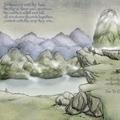LAO-TSEU : Tao Te King, Livre 1: chapitre 6
LAO-TSEU : Tao Te King, Buch 1: Kapitel 6
LAO-TSEU: Tao Te King, Book 1: chapter 6
LAO-TSEU: Tao Te King, Libro 1: capítulo 6
LAO-TSEU:『タオ・テ・キング』第1巻:第6章
라오쩌둥: 도덕경, 1권: 6장
LAO-TSEU: Tao Te King, Księga 1: rozdział 6
LAO-TSEU: Tao Te King, Livro 1: capítulo 6
ЛАО-ЦЗЭУ: Дао дэ Царь, книга 1: глава 6
LAO-TSEU: Tao Te King, Kitap 1: bölüm 6
6.
L'esprit de la vallée 3 ne meurt pas ; on l'appelle la femelle mystérieuse.
|||valley|||||||female|
The spirit of Valley 3 does not die; it is called the mysterious female.
La porte de la femelle mystérieuse s'appelle la racine du ciel et de la terre.
|||||mysterious|is called||||||||
The door of the mysterious female is called the root of heaven and earth.
Il est éternel et semble exister (matériellement).
||||||materially
He is eternal and seems to exist (materially).
Si l'on en fait usage, on n'éprouve aucune fatigue.
||||||doesn't feel||fatigue
If one makes use of it, one feels no fatigue.
Notes du chapitre 6
Notes from chapter 6
| 3 |L'expression kou-chen , « l'Esprit de la vallée », désigne le Tao.
||||||valley|designates||
| 3 | The expression kou-chen, "the Spirit of the valley", refers to the Tao.
Le mot kou , « vallée », se prend ici dans un sens figuré.
||or||||||||
The word kou, "valley", is taken here in a figurative sense.
Une vallée est vide et cependant elle a un corps, c'est-à-dire elle existe matériellement.
A valley is empty and yet it has a body, that is, it exists materially.
Mais « l'Esprit de la vallée » est vide et immatériel (littéralement : et sans corps).
|||||||||literally|||
But "the Spirit of the valley" is empty and immaterial (literally: and without body).
Ce qui est vide et immatériel n'a point reçu la vie ; comment pourrait-il mourir ?
|||||immaterial|||||||||
What is empty and immaterial has not received life; how could he die?
L'expression kou-chen , « l'Esprit de la vallée », est destinée à exprimer sa vertu (la vertu du Tao).
||||||||intended||express||virtue||||
The expression kou-chen, "the Spirit of the valley," is intended to express his virtue (the virtue of the Tao).
L'expression hiouen-p'in , « la femelle mystérieuse », sert à exprimer ses mérites.
||||||||express||
The expression hiouen-p'in, "the mysterious female", serves to express its merits.
Cette « femelle » produit tous les êtres.
This "female" produces all beings.
On l'appelle hiouen , « mystérieuse », pour dire que si l'on voit naître les êtres, on ne voit pas ce qui les fait naître.
||beast|||||||||||||||||||
It is called hiouen, "mysterious", to say that if we see the birth of beings, we do not see what gives birth to them.
Le mot hiouen a le sens de « obscur, profond, impénétrable ».
|||||||obscure||
The word hiouen has the meaning of "dark, deep, impenetrable".
Tous les êtres ont reçu la vie, et, en conséquence, ils sont sujets à la mort.
All beings have received life, and therefore are subject to death.
« L'Esprit de la vallée » n'est point né, c'est pourquoi il ne meurt pas.
||||is||||||||
"The Spirit of the valley" is not born, therefore he does not die.

